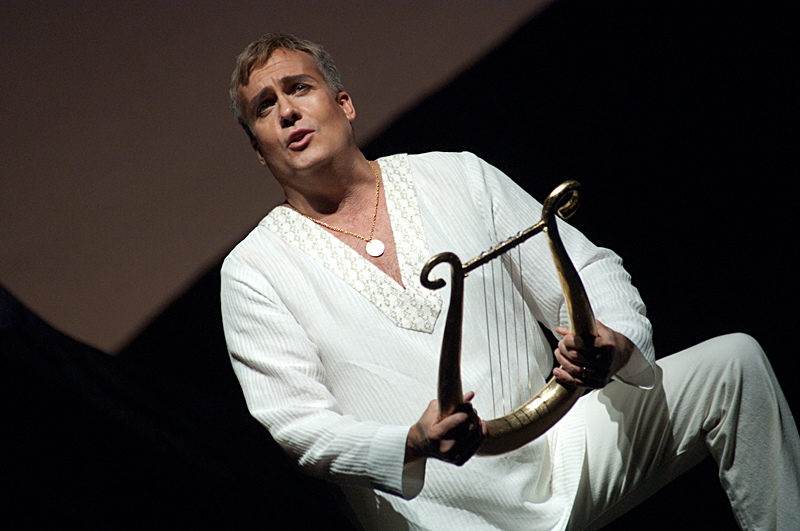The only real dramaturgical flaw in Gluck’s otherwise thoughtfully plotted Orphée et Eurydice is the same one that mars any retelling of the Greek myth: Why doesn’t Orphée simply tell Eurydice that he’s not allowed to look at her? Then she wouldn’t be all “Why are you ignoring me” and he wouldn’t be all “Back off, I’m dealing with some stuff,” and the two could get on with living happily ever after.
As it happens, librettist Ranieri de’ Calzabigi wrote the pair a happy ending anyway. Seattle Opera’s production of Gluck’s 1762 opera (in his French-language rewrite of 1774) is uncluttered but telling and lovely, with stirring choral work (they’re almost always onstage) and attractive dance interludes from a seven-member troupe, choreographed by Yannis Adoniou. The tale begins in medias res with Eurydice’s funeral, affectingly staged by Jose Maria Condemi as a procession of chorus members, robed in black, who wind their way across the stage and make sharp silhouettes against the champagne- colored rear wall.
Amour’s witty entrance—a surprise I won’t spoil—relieves the gloom and sends Orphée, after a triumphantly ornate aria, on a quest to bring his love back from Hades, portrayed by a lurid scab-red backdrop resembling nerves and tendons. With Heidi Zamora’s costumes (stretchy cowls that the chorus and dancers pull up over their grimacing faces and angled arms), it all looks a bit like a choir of Munch Screams in a Fantastic Voyage nightmare. To follow this scene, set designer Phillip Lienau’s conception of the underworld’s Elysian Fields seems quintessentially Seattleite: a lush emerald lawn and a cloudless blue sky.
Of the small cast—two-thirds of whom are mentioned in the title—William Burden’s Orphée bears the heaviest responsibility. A core of ardent pathos framed by the somber stylization of the staging, Burden was emotionally convincing throughout, vocally combining French chastity with just a dash of Italianate sob, and valiant in the coloratura (extremely rare in tenor roles). Davinia Rodriguez matched his passion during Eurydice’s brief interludes of resurrection, and made me want to hear more of her, maybe in one of Verdi or Puccini’s big, throbbing heroine roles. Julianne Gearhart made a Puck-like, fresh-voiced Amour.
In the pit, conductor Gary Thor Wedow elicited from the Seattle Symphony a lithe, crisp, vigorous period-instrument sound; it’s amazing to think these are the same musicians who lavish such velvety opulence on Wagner and Strauss.







